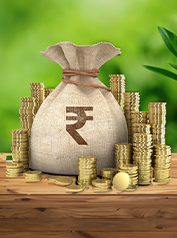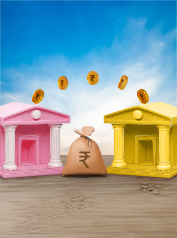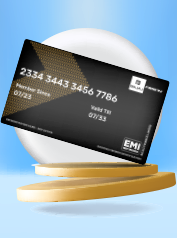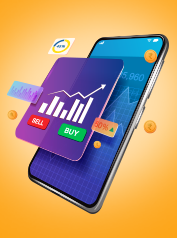Enjoy low-risk investments with interest rates up to 8.55% p.a., flexible tenures, and a convenient booking process on Bajaj Markets.
Enjoy low-risk investments with interest rates up to 8.55% p.a., flexible FD tenures, compare options and a convenient booking process on Bajaj Markets.


6+ Issuers

Digital Process

Flexible Tenures

Convenient Interest Payout
FDs can be considered low-risk investments that offer fixed returns. FDs issued by banks are insured by the Deposit Insurance and Credit Guarantee Corporation (DICGC) for up to ₹5 Lakhs per depositor. For FDs issued by NBFCs, the safety of your investment depends on the NBFCs credit rating—a higher rating indicates lower risk and more secure returns.
The maximum tenure for a fixed deposit depends on the bank or NBFC you choose. It typically ranges from 7 days to 10 years.
A cumulative FD compounds the interest earned and pays it out at maturity. In a non-cumulative FD, the interest is paid out periodically—monthly, quarterly, half-yearly, or annually.
Banks and NBFCs offer periodic interest payout options such as monthly, quarterly, half-yearly, or annually. Alternatively, you can opt for a cumulative interest payout, where the interest is compounded and paid upon maturity.
The minimum amount required to book an FD depends on the bank or NBFC you choose. On Bajaj Markets, you can book an FD with as little as ₹1,000.
Yes, most Fixed Deposits provide compound interest, which is calculated on the principal and accumulated interest.
There is no limit; you can open multiple FDs across different banks or financial institutions.
FDs can offer monthly interest payouts if you choose the periodic payout option.
Yes, investing in FDs is good for those seeking guaranteed returns and low-risk investment options.
A 1-year FD is suitable for short-term financial goals with assured returns.
FD returns are calculated using the formula the following formula:
M = P + (P × r × t/100),
Where M is maturity amount, P is principal, r is annual interest rate, and t is tenure.
Yes, but premature withdrawal may incur penalties and reduce the effective returns.
The 1-2-3 rule refers to diversifying FD investments into 1-year, 2-year, and 3-year tenures for liquidity and better returns.
Many banks and NBFCs offer you the option to opt for a loan against FD. You can typically receive up to 75% to 90% of your FD amount. The interest rate for a loan against FD is generally lower than the interest rate offered by personal loans.
Most banks and NBFCs offer an auto-renewal facility for FDs. You can also opt to renew your FD manually upon maturity by logging into your account and selecting the renewal option. Your FD can be renewed for either the same tenure or a different one, based on your preference.
The interest earned on your FD is fully taxable. If the interest exceeds ₹40,000, or ₹50,000 for a senior citizen, in a financial year, TDS is deducted by the bank or NBFC.
An FDR includes essential details such as the depositor's name, principal amount, interest rate, maturity date, tenure, interest payout frequency, and FD account number. It may also include the terms and conditions related to premature withdrawals and associated penalties.












